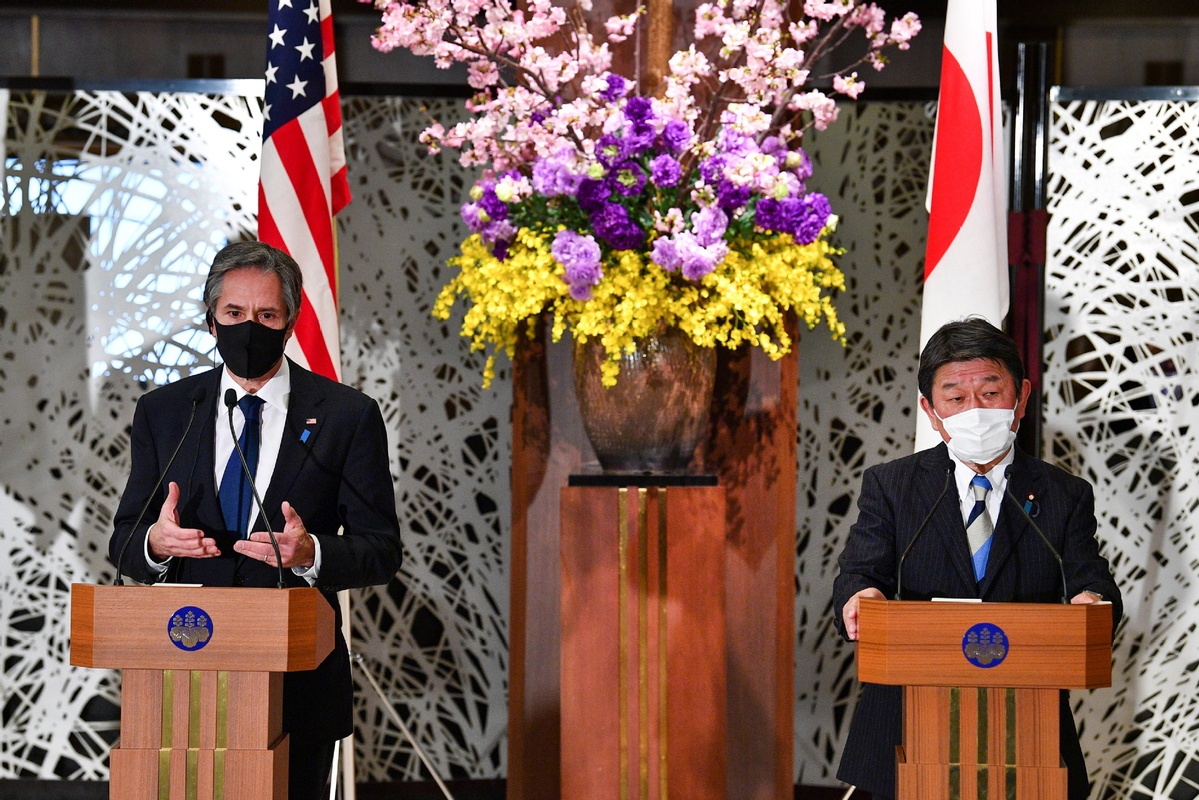
US Secretary of State Antony Blinken and Japan's Foreign Minister Toshimitsu Motegi attend a news conference after the Japan - US Security Consultative Committee (SCC) 2+2 Meeting in Tokyo, Japan, March 16, 2021. [Photo/Agencies]
Beijing called on Tuesday for cooperation that promotes peace and stability in the Asia-Pacific region, while denouncing allegations made by the United States and Japan against China.
"Communication and cooperation between the United States and Japan should be conducive to enhancing the mutual understanding and trust among regional countries," Foreign Ministry spokesman Zhao Lijian said. Zhao was commenting on top-level diplomatic and military talks between the United States and Japan aimed at bolstering their alliance. The talks were held earlier on Tuesday in Tokyo.
According to Western media, the US and Japan warned China against "coercion and destabilizing behavior" in the region during the discussions.
According to reports, the senior officials discussed Hong Kong, Taiwan, Xinjiang and Tibet issues, which are China's internal affairs, and the issue of the South China Sea, to which the two countries are outside powers.
Zhao said the talks "should help in strengthening regional solidarity and cooperation, as well as promoting the peace and stability of the Asia-Pacific region", adding that US-Japan cooperation should "neither target a third party nor damage the interests of a third party".
US Secretary of State Antony Blinken and Secretary of Defense Lloyd Austin are in Japan on the first leg of their first overseas trip under the new US administration of President Joe Biden. The two will also visit the Republic of Korea.
In a joint statement issued after their talks with their Japanese counterparts, Foreign Minister Toshimitsu Motegi and Defense Minister Nobuo Kishi, they said: "China's behavior, where inconsistent with the existing international order, presents political, economic, military and technological challenges."
Xu Liping, a researcher at the Chinese Academy of Social Sciences' National Institute of International Strategy, said it is totally unreasonable for the US and Japan to make such a remark against China.
"The US and Japan are trying to strengthen cooperation by painting China as a common enemy. It is not conducive to regional stability," he said.
Liu Qingbin, a professor at the Institute of Advanced Sciences at Yokohama National University in Japan, said it is obvious that the US is trying to amplify the existing disputes between China and Japan with this visit.
Washington's efforts to foment unrest in the region and interfere in China's internal affairs are deeply rooted in the US willingness to gloss over China's development and its increasing contribution to the world, Liu said.
"They failed to recognize the international status that China deserves. They kept saying that China is a threat to world order. But what's the world order built on? It wasn't necessarily a good order anyway," Liu said.
"They see China catching up as a threat to them being No 1 in everything. But why does anybody have to be No 1 in anything? Why can't they just coexist?"
Zhou Jin in Beijing contributed to this story.


